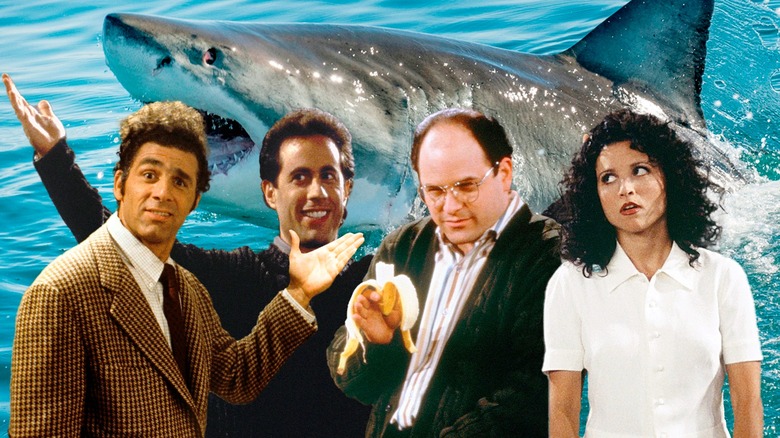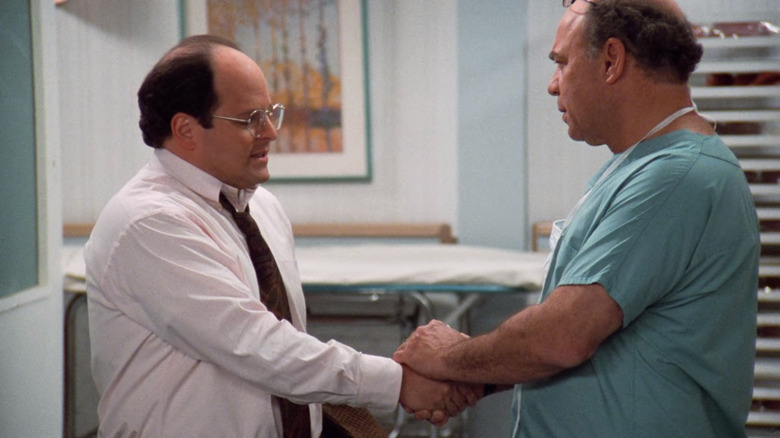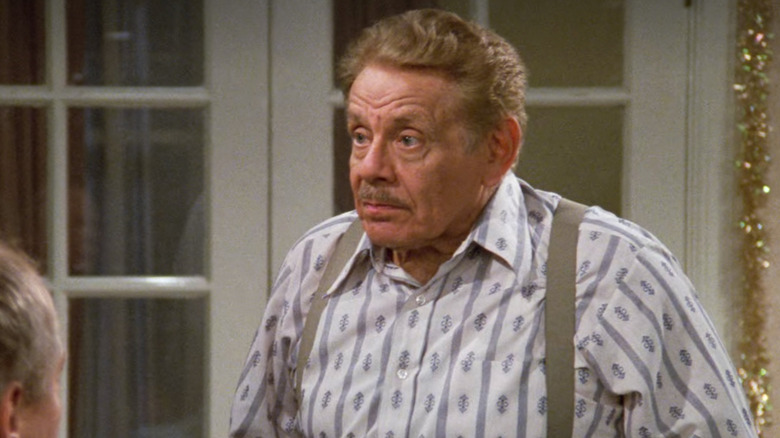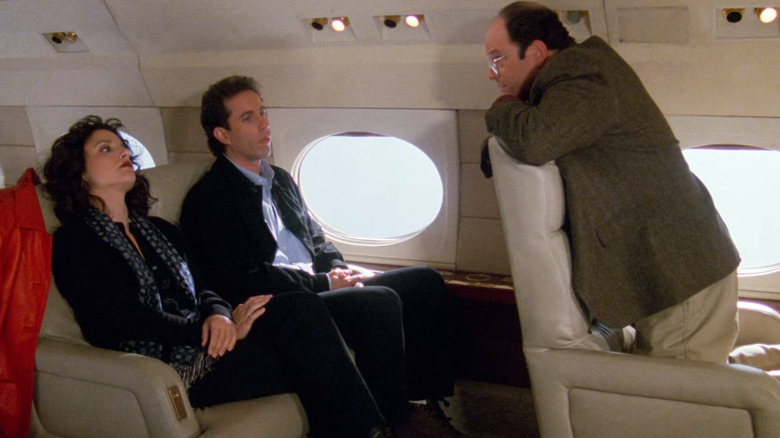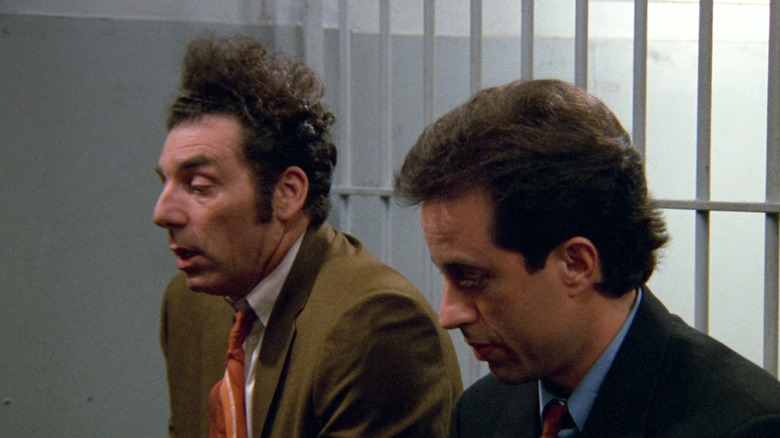This Is The Exact Moment That Seinfeld Jumped The Shark
"Seinfeld" lasted nine seasons, anchoring NBC's Thursday night lineup from 1989 until its memorable but controversial ending in 1998. Like most shows with such a long life, it had its share of behind-the-scenes changes that led to subtle but distinct changes in tone and attitude. In pop culture, the moment that those changes become noticeable has long been known as "jumping the shark," a phrase that was born when Arthur "Fonzie" Fonzarelli (Henry Winkler) responded to a challenge from a group of wannabe bullies in Season 5 of "Happy Days" by literally jumping over a penned-in shark on water skis.
However, while we often use the term "jump the shark" to mean the point where a show slides downhill and never recovers, the truth is more subtle than that — if we properly assess the meaning, here, "jumping the shark" means the moment when a show diverges from its established patterns and turns into a different show, even if it's not necessarily for the worse. Consider "Happy Days," for instance, which certainly didn't suffer a rating decline following the aforementioned Fonzie shark-jump.
And while "Seinfeld" remained a successful show throughout its long run, with some of its funniest episodes happening toward the end, there certainly is one devastating moment in Season 7 that forever redefined the show's future — by turning it into something that was, paradoxically, both meaner and sillier than what came before.
The death of Susan Ross marked a sharp left turn for Seinfeld
When George's (Jason Alexander) fiance Susan Ross (Heidi Swedberg) dies in the Season 7 finale after licking toxic wedding invitation envelopes that he had picked out, it was an unusually dark development for a series that until that point had been more focused on lower-stakes mundanities like answering machine messages, annoying parents, and a very long overdue library book.
While Susan was not the first "Seinfeld" character to die in the series, George's explicit responsibility for her death and his totally emotionless reaction to hearing the news turned him from a somewhat lovable hapless buffoon into a heartless and emotionally stunted jerk. The lovable but underdeveloped loser showed the coldest chamber of his heart in that moment, and his lack of even the tiniest fragment of sadness or remorse made it hard to root for him from that moment on ... something deepened by his conduct, from that episode onward. From there, in the final two seasons of "Seinfeld," George goes on to exploit Susan's death in an attempt to pick up other women, has Jerry call in a bomb threat to Yankee Stadium to avoid getting in trouble with George Steinbrenner, and creates a fake charity, "The Human Fund," to get out of giving his co-workers holiday gifts. He also becomes fixated on inheriting his parents' money when they die, with no apparent sadness that he soon may be without them.
Like Happy Days, Seinfeld remained popular after jumping the shark
Again, we have to emphasize that a show's "jumping the shark" moment doesn't necessarily mark a decline in quality or popularity. Just as "Happy Days" stayed atop the ratings after Fonzie's epic water-skiing stunt, "Seinfeld remained the No. 1 show on television for its final two seasons, which included such series-defining moments as the return of Festivus to George's life, Jerry and Kramer (Michael Richards) swapping apartments and personalities in "The Chicken Roaster," and Izzy Mandelbaum (Lloyd Bridges) tragically and temporarily stepping in as Jerry's personal trainer.
However, it was a different show after Susan died, particularly where George was concerned. By the time of the Season 8 finale, "The Summer of George," our now unsympathetic anti-hero is fired from his cushy job as the New York Yankees' traveling secretary and decides to spend his severance pay being as lazy as is humanly possible. In a bit of karmic comeuppance, he ends up losing the use of his legs and is told he may never walk again by Dr. Wexler (Victor Raider-Wexler), the same man who tried in vain to save Susan's life. Still, there's definitely no redemption to be found here, as George continues growing more and more self-absorbed until the end of the series.
Another important nuance to this shark jump? The end of Season 7 — and the death of Susan — also coincided with co-creator Larry David's departure from the show as head writer, leaving Jerry Seinfeld at the helm for the final two seasons.
Seinfeld had its most objectionable moment in Season 9
Without Larry David and his notoriously neurotic personality driving Seinfeld" in Seasons 8 and 9, the show began to deviate from obsessing over the tiny frustrations of life — like a misplaced shirt button, the vagaries of dating, parking in New York City, and ordering soup from a self-important restaurant owner. Many of the episodes in Seasons 8 and 9 took on a more expansive scope and became less grounded in reality.
The series' darkest moment came in Season 9, Episode 20, "The Puerto Rican Day," when Seinfeld and the rest of the show's writers made a grievous error in judgment in having Kramer burn the Puerto Rican flag and make the comment that people rioting and vandalizing their car was, "Like every day in Puerto Rico." The misstep eventually prompted an apology from Seinfeld and the network, and it resulted in the episode being temporarily removed from syndication. Manuel Mirabal, president of the National Puerto Rican Coalition, told The Washington Post, "I was concerned that the Latinos depicted in the show were very stereotypical, like in 'West Side Story,' wearing the kind of clothes that people wore 40 years ago. Then Kramer started running around with the Puerto Rican flag. ... At the point at which the flag was burned, my blood started boiling."
To be clear, this episode only happened because the tone of "Seinfeld" had changed so much after David's departure, and because the death of Susan had so severely upped the stakes that bombastic storylines like this one suddenly became possible.
Seinfeld came close to violating its core principle in its last two seasons
Also in those final two seasons, some episodes came dangerously close to providing moral lessons, nearly violating David's famous motto of "no hugging, no learning." In Season 8, Episode 9, "The Abstinence," refraining from sex makes George more sharp-witted and capable while turning Elaine (Julia Louis-Dreyfus) into a bumbling dolt. Simultaneously, Kramer takes up smoking and suffers obvious physical damage. While there is still no hugging (at least on screen), the four main characters are often put through circumstances that seem designed to emphasize that decisions have consequences, even if they are not necessarily the ones suffering those consequences.
That notion comes to a head in the two-part "Seinfeld" series finale, which was an even more dramatic departure from the tenor of the show's first seven seasons. First, the show' famous motto is almost abandoned when Jerry, George, Elaine, and Kramer nearly come to hugs when they think the private NBC-owned jet they are riding to Paris is about to crash. Ironically, it's George who seems closest to making a major life change in this moment when he confesses to cheating in the "master of my domain" contest from Season 4, Episode 11.
But then, the rest of the finale happens, and the low-stakes nature of the show is forever thrown to the wolves.
The Seinfeld finale punctuated the show's change in mood and direction
Larry David returned to the writer's room to pen that infamous finale, which Marvin Kitman of Newsday called "The next level of surrealism after the Puerto Rican Day Parade episode," adding that if anything, the "Seinfeld" grew deserved jailtime for how much less funny the show had become in its last two seasons.
In a 2014 interview with Grantland's Bill Simmons, David acknowledged that fans were disappointed in the finale but defended the choices he and Seinfeld made in bringing the core four characters to justice for their nine seasons of selfish behavior. "I was not interested in an emotional ride, and neither was Jerry," David said. "No wonder why they [fans] would dislike it, yeah. But let me toot my own horn for a second. I thought it was clever to bring back all those characters in a courtroom and testify against them for what they did." That same year, Seinfeld also found the need to defend the finale in a reddit AMA.
So yes, great as "Seinfeld" was and will forever be, there's a distinct difference between the pre-death episodes and the post-death ones. The off-message tone of the last two seasons, combined with a controversial final episode, don't fit with the glories of what came before. However, great moments still punctuated both last seasons, and so, it's no wonder that "Seinfeld" remains one of the most beloved sitcoms in modern memory, more than two decades after it wrapped.
